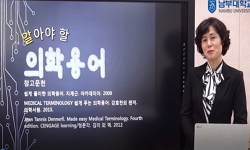Korea has become an aged society with the rapidly growing elderly population and Long-term care hospitals have sharply increased. As a result, it is very important to manage the quality at long-term care hospitals and nursing work performance has been...
http://chineseinput.net/에서 pinyin(병음)방식으로 중국어를 변환할 수 있습니다.
변환된 중국어를 복사하여 사용하시면 됩니다.
- 中文 을 입력하시려면 zhongwen을 입력하시고 space를누르시면됩니다.
- 北京 을 입력하시려면 beijing을 입력하시고 space를 누르시면 됩니다.
요양병원 간호사의 대인관계능력, 극복력, 직무만족이 간호업무성과에 미치는 영향 = Factors Affecting Nursing Work Performance of Nurses in Long-term Care Hospitals - Interpersonal Relations, Psychological Resilience, Job Satisfaction -
한글로보기부가정보
다국어 초록 (Multilingual Abstract)
Korea has become an aged society with the rapidly growing elderly population and Long-term care hospitals have sharply increased. As a result, it is very important to manage the quality at long-term care hospitals and nursing work performance has been very important.
This descriptive study aimed to investigate interpersonal relations, psychological resilience, job satisfaction and nursing work performance of nurses in long-term care hospitals, their relationship and to analyze the effect of the factors on nursing work performance. to improve the quality at long-term care hospitals. The study subjects were nurses that have been working for more than 6 months at 17 long-term care hospitals in Gyeongsangnam-do. The survey has been conducted from December 10, 2018 to February 15, 2019.
The tool of interpersonal relations used is Relationship Change Scale (RCS) developed by Guerney (1977), translated by Mun, Sun-Mo (1980) and revised by Jang, Hye-Suk (2008). The instrument of Psychological Resilience was made by Park, Mi Mi and Park Jee-Won. Job satisfaction tool was developed by Slavitt, Stamps, Piedmont and Hasse (1978), translated and factor-analyzed by Park, Sung-Ae, Yun, Soon-Nyoung (1992) and modified by An, Eun-Mi (2012). The tool of nursing work performance was created by Go, Yu-kyung, Lee Tae-wha & Im Ji-young (2007).
The data were analyzed by descriptive statistics, t-test, ANOVA, Schéffe's test, and Pearson's Correlation coefficients and Multiple regression with the SPSS/WIN 23.0 Program.
The result of this study are as followings:
1. General characteristics of the research subjects were 95.5% female and 4.5% male. The average age was 41.46±10.42 year-old and ‘40∼49’ was the biggest group at 30.4%. The majority of them were the married at 79.9%, most declared their religion was ‘nothing’ at 46,9%. The biggest share of the subjects had ‘3year-professional college graduate as their final education level at 60.3%. 74.6% of the subjects’ position of work was ‘General nurse’, and 42.9% of them had ‘1 shift’ for their type of working shift at 42.9%, 24.0% of them had a total clinical career of ‘more than 5years~10years or less’, 47.8% of them had a career in long-term care hospital for ‘3 years or less’, 53.6% of them had a salary of ‘2 million won or more~less than 2.5 million won’.
2. The average score of interpersonal relations of the subject was 3.56±0.39 point. in sub-dimension, Intimacy was the highest(3.69) and Openness was the lowest(3.40). The average score of Psychological Resilience of the subject was 3.69±0.47 point. In sub-dimension, Situational pattern(3.77) was the highest and dispositional pattern(3.57) was the lowest. The average score of Job satisfaction of the subject was 3.15±0.38 point. In sub-dimension, Interaction factor was the highest(3.66) and Pay factor was the lowest(2.66). The average score of nursing work performance of the subject was 3.73±0.41 point. In sub-dimension, Competency was the highest(3.81) and Application of nursing process was the lowest.
3. The interpersonal relations of the subject according to said individual’s general characteristics had a statistically significant difference with final education(F=6.61, p<.001), the type of work (F=4.04, p=.008), number of beds(F=3.39, p=.035), the Psychological resilience of the subject with individual’s general characteristics had a statistically significant difference with age(F=6.65, p<.001), marital status(t=3.21, p=.002), religion(F=4.51, p=.002), final education(F=7.11, p<.001), the type at workplace(F=7.23, p<.001), total clinical career(F=2.97, p=.020), number of beds(F=6.93 p=.001). the job satisfaction of the subject with individual’s general characteristics had statistically meaningful difference with final education(F=5.08, p=.002), the type of work at workplace(F=2.77, p=.042), total clinical career(F=2.95, p=.021). the nursing work performance of the subject with individual’s general characteristics had a statistically significant difference with gender(t=-2.45, p<.015), age(F=10.65, p<.001), marital status(t=4.12, p<.001), final education(F=6.76, p<.001), the position at workplace(F=5.46, p=.001), type of work at (F=6.85, p<.001), total clinical career(F=9.00, p<.001), career in long-term care hospital (F=3.80, p<.024).
4. According to the correlation analysis, interpersonal relations had a statistically significant positive correlation with Psychological Resilience(r=.67, p<.001), job satisfaction(r=.34, p<.001) and nursing work performace(r=.53, p<.001). Psychological Resilience had a statistically significant positive correlation with job satisfaction(r=.42, p<.001) and nursing work performace(r=.66, p<.001). Job satisfaction had a statistically significant positive correlation with nursing work performace(r=.47, p<.001).
5. The result of the multiple regression analysis of the factors affecting nursing work performance, the regression model was statistically significant. Psychological resilience(β=.42, p<.001), job satisfaction(β=.21, p<.001), interpersonal relations(β=.17, p=.008) were influencing on the nursing work performance, and the explanatory power(F=23.17, p<.001) among these variables was 54.6% .
Through the results of this study, Nursing work performance of nurses in long-term care hospitals is affected by Psychological Resilience, Job satisfaction, interpersonal relations. In order to enhance nursing work performance of nurses in long-term hospital, it is important to improve their ability to overcome clinical stress situations, increase job satisfaction, and enhance interpersonal skills among various members. In addition, systematic and policy support such as relevant programs and work environment to enhance nursing work performance of the nurses in long-term care hospitals should be provided.
국문 초록 (Abstract)
요양병원 간호사의 대인관계능력, 극복력, 직무만족, 간호업무성과에 대한 관련성을 확인하고, 간호업무성과에 미치는 영향을 파악함으로써 요양병원에서 근무하는 간호사의 질 향상을 위...
요양병원 간호사의 대인관계능력, 극복력, 직무만족, 간호업무성과에 대한 관련성을 확인하고, 간호업무성과에 미치는 영향을 파악함으로써 요양병원에서 근무하는 간호사의 질 향상을 위한 방안을 수립하고자 시행된 서술적 조사연구이다.
본 연구대상자는 경상남도에 소재한 17곳의 요양병원에서 근무하고 있는 간호사 중 해당 경력 6개월 이상의 간호사로 본 연구의 목적을 이해하고 자의적으로 연구 참여에 동의한 간호사 총 224명을 대상으로 하였으며, 자료수집 기간은 2018년 12월 10일부터 2019년 2월 15일까지 연구를 시행하였다.
대인관계능력을 측정하기 위하여 Guerney (1977)가 개발한 대인관계 변화척도(Relationship Change Scale, RCS)를 문선모(1980)가 번역한 것을 장혜숙(2008)이 수정·보완한 도구를 사용하였으며, 극복력을 측정하기 위하여 박미미와 박지원(2016)이 개발한 도구를 사용하였다. 직무만족을 측정하기 위해 Slavitt, Stamps, Piedmont와 Hasse (1978)가 개발하고 박성애와 윤순녕(1992)이 요인분석한 것을 안은미(2012)가 수정·보완한 도구를 사용하였고, 간호업무성과를 측정하기 위해 고유경, 이태화, 임지영(2007)이 개발한 도구를 사용하였다.
수집된 자료는 IBM SPSS statistics 23.0 program을 이용하여 기술통계, t-test, ANOVA, Scheffe’s test, Pearson’s correlation coefficient, Multiple regression으로 분석하였다.
본 연구의 결과는 다음과 같다.
1. 연구대상자의 제 특성은 ‘여성’ 95.5%(214명), ‘남성’ 4.5%(10명)이었으며, 평균 연령은 41.46±10.42세이며, ‘40세∼49세’가 30.4%(68명)로 가장 많았다. 결혼 상태는 ‘기혼’ 79.9%(179명)였고, 종교는 ‘없음’이 46.9%(105명)로 가장 많았으며, 학력은 ‘3년제 간호대학 졸업’이 60.2%(135명)로 가장 많았다. 직위는 ‘일반간호사’ 74.5%(167명), 근무형태는 ‘고정근무’ 42.9%(96명), 총 근무경력은 ‘5년 초과∼10년 이하’ 24.0%(54명), 요양병원 경력은 ‘3년 이하’ 47.8%(107명)로 가장 많았으며, 월급은 ‘200만원 초과∼250만원 이하’가 53.5%(120명)로 가장 많았다.
2. 연구대상자의 대인관계능력 평균은 3.56±0.39점이었고, 하위영역 중 친근감(3.69점)이 가장 높았으며, 개방성(3.40점)이 가장 낮았다. 연구대상자의 극복력 평균은 3.69±0.47점이었고, 하위영역 중 상황적 패턴(3.77점)이 가장 높았으며, 기질적 패턴(3.57점)이 가장 낮았다. 연구대상자의 직무만족 평균은 3.15±0.38점이었고, 하위영역 중 상호작용(3.66점)이 가장 높았고, 보수(2.66점)가 가장 낮았다. 연구대상자의 간호업무성과 평균은 3.73±0.41점이었고, 하위영역 중 업무수행능력(3.81점)이 가장 높았으며, 간호과정적용(3.60점)이 가장 낮았다.
3. 연구대상자의 제 특성에 따른 대인관계능력은 최종학력(F=6.61, p<.001), 근무형태(F=4.04, p=.008), 병상 수(F=3.39, p=.035)에 유의한 차이가 있었고, 연구대상자의 제 특성에 따른 극복력은 연령(F=6.65, p<.001), 결혼 상태(t=3.21, p=.002), 종교(F=4.51, p=.002), 최종학력(F=7.11, p<.001), 근무형태(F=7.23, p<.001), 총 근무경력(F=2.97, p=.020), 병상 수(F=6.93 p=.001)에 유의한 차이가 있었다. 연구대상자의 제 특성에 따른 직무만족은 최종학력(F=5.08, p=.002), 근무형태(F=2.77, p=.042), 총 근무경력(F=2.95, p=.021)에 차이가 있었고, 연구대상자의 제 특성에 따른 간호업무성과는 성별(t=-2.45, p<.015), 연령(F=10.65, p<.001), 결혼 상태(t=4.12, p<.001), 최종학력(F=6.76, p<.001), 직위(F=5.46, p=.001), 근무형태(F=6.85, p<.001), 총 근무경력(F=9.00, p<.001), 요양병원 경력(F=3.80, p<.024)에 유의한 차이가 있었다.
4. 연구대상자의 대인관계능력, 극복력, 직무만족, 간호업무성과의 상관관계 분석 결과, 대인관계능력은 극복력(r=.67, p<.001), 직무만족(r=.34, p<.001) 및 간호업무성과(r=.53, p<.001)와 유의한 정적인 상관관계가 있었다. 극복력은 직무만족(r=.42, p<.001) 및 간호업무성과(r=.66, p<.001)와 정적인 상관관계가 있었고, 직무만족은 간호업무성과와 유의한 정적인 상관관계가 있었다(r=.47, p<.001).
5. 연구대상자의 간호업무성과에 영향을 미치는 요인은 Multiple regression으로 분석한 결과, 극복력(β=.42, p<.001), 직무만족(β=.21, p<.001), 대인관계능력(β=.17, p=.008) 순으로 산출되었다. 간호업무성과 회귀분석은 통계적으로 유의하였고(F=23.17, p<.001), 간호업무성과의 설명력은 54.6%로 나타났다.
본 연구에서는 요양병원 간호사의 간호업무성과에 영향을 미치는 요인을 분석한 결과, 요양병원 간호사의 간호업무성과를 증진하기 위해서는 임상에서 직면하는 다양한 스트레스 상황에서의 극복력을 향상시키고, 보수와 근무환경 등의 직무만족을 증가시키며 여러 병원구성원 간의 대인관계능력을 높이는 것이 중요한 요인임을 확인하였다. 또한, 요양병원 간호사들의 간호업무성과를 증진시키기 위한 관련 프로그램 및 근무환경 및 평가시스템 등 조직적·정책적인 뒷받침도 제공되어야 할 것이다.
목차 (Table of Contents)
- 국 문 요 약 v
- I. 서론 1
- 1. 연구의 필요성 1
- 2. 연구목적 3
- 국 문 요 약 v
- I. 서론 1
- 1. 연구의 필요성 1
- 2. 연구목적 3
- 3. 용어정의 4
- II. 문헌고찰 6
- 1. 요양병원 간호사 6
- 2. 간호업무성과 7
- 3. 간호업무성과의 요인 9
- 1) 대인관계능력 9
- 2) 극복력 11
- 3) 직무만족 13
- III. 연구방법 16
- 1. 연구설계 16
- 2. 연구대상 16
- 3. 연구도구 17
- 4. 연구진행절차 19
- 5. 윤리적 고려 19
- 6. 자료수집방법 20
- 7. 자료분석방법 20
- IV. 연구결과 21
- 1. 대상자의 제 특성 21
- 2. 대상자의 대인관계능력, 극복력, 직무만족과 간호업무성과의 정도 23
- 3. 대상자의 대인관계능력, 극복력, 직무만족 및 간호업무성과의 세부문항 정도 25
- 4. 대상자의 제 특성에 따른 대인관계능력, 극복력, 직무만족과 간호업무성과 차이검증 33
- 5. 대상자의 대인관계능력, 극복력, 직무만족, 간호업무성과와의 관계 37
- 6. 대상자의 간호업무성과에 영향을 미치는 요인 38
- V. 논의 40
- 1. 대상자의 대인관계능력과 극복력, 직무만족, 간호업무성과 40
- 2. 대상자의 제 특성에 따른 대인관계능력, 극복력, 직무만족, 간호업무성과 44
- 3. 대상자의 대인관계능력, 극복력, 직무만족, 간호업무성과와의 상관관계 46
- 4. 대상자의 간호업무성과에 미치는 요인 47
- Ⅵ. 결론 및 제언 51
- 1. 결론 51
- 2. 제언 53
- 참고문헌 54
- Abstract 68
- 부록 71












